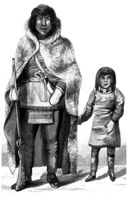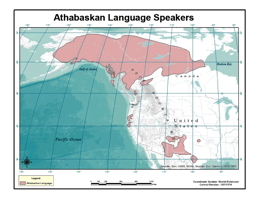
|
The Society of Folk Dance Historians (SFDH) Athabaskans
[
Home |
About |
Encyclopedia | CLICK AN IMAGE TO ENLARGE |

|
 The name Athabaskan (ath-uh-PAS-ken; also spelled "Athapascan") came from the Canadian lake the Cree called Athabasca, which means "grass here and there." Today the term also refers to the language spoken by eleven groups of Alaska Native. The Alaskan Athabaskan call themselves Dene (or Dinnie), meaning "the People." The Athabaskan are a Subarctic people who live in an area directly south of the true Arctic regions. Their land stretches from the border of the Canadian Yukon Territory to just beyond the Arctic Circle. They once wandered throughout a vast region, but after Europeans came they built villages of fifty to five hundred people along the Yukon, Koyuckuk, Tanana, and Copper Rivers.
The name Athabaskan (ath-uh-PAS-ken; also spelled "Athapascan") came from the Canadian lake the Cree called Athabasca, which means "grass here and there." Today the term also refers to the language spoken by eleven groups of Alaska Native. The Alaskan Athabaskan call themselves Dene (or Dinnie), meaning "the People." The Athabaskan are a Subarctic people who live in an area directly south of the true Arctic regions. Their land stretches from the border of the Canadian Yukon Territory to just beyond the Arctic Circle. They once wandered throughout a vast region, but after Europeans came they built villages of fifty to five hundred people along the Yukon, Koyuckuk, Tanana, and Copper Rivers.
The term "Athabaskan" is commonly associated with the language family. There are eleven different Athabascan languages in Alaska, many others in Canada, some in Oregon and California, and the Navajo and Apache languages in the Southwestern United States.
The Athabaskan were among the first people to arrive in North America. According to scientists, they crossed a land bridge that linked Siberia and Alaska as many as forty thousand years ago. The Athabaskan people have lived for centuries in the vast, awe-inspiring, and sometimes forbidding wilderness of rolling, ice-covered hills and evergreen forests of the Subarctic region of Alaska. Short summers of twenty-four-hour sunlit days are followed by long, often brutal winters with heavy snowfalls. Living in remote locations where roads are few, these hardy people retained many of their old ways, while adopting useful elements of modern culture.
The Alaskan Athabaskan pursued a nomadic existence based mostly on hunting until the arrival of whites in the late 1700s. Even though some groups did not see their first white men until well into the 1800s, they spoke of a new race of people who would come, kill the natives, and take away their hunting grounds. Those whites who established relations among the Alaskan Athabaskan fell victim to their wars with other tribes – wars in which the Athabaskan sought revenge for trespassing or wars that occurred because a group was suspicious of and hostile to anyone who was different.
The Alaskan Athabaskan lived a life in close harmony with nature. Their religious beliefs were based on their relationship with the supernatural spirits in plants, animals, and natural phenomena. The spirit world included both well-meaning and evil characters who had to be kept happy with songs, dances, and charms. Probably the most important aspect of their religion was the connection they had with the animals on which they depended for their very existence. The Athabaskan considered animals equal to them and believed people would be reborn after death as animals.
This page © 2018 by Ron Houston.
Please do not copy any part of this page without including this copyright notice.
Please do not copy small portions out of context.
Please do not copy large portions without permission from Ron Houston.